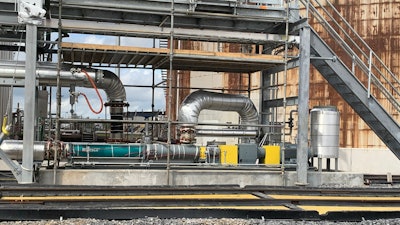
Requirements for fluid mixes of animal fat and kitchen oil pumping needed
A major terminal operator in the U.S., with a site located in the Gulf of Mexico area required dependable transfer power to handle and store a variety of bulk liquid products. Using NETZSCH pumps, this customer now reliably unloads up to 80 rail cars per day that are filled with a fluid mix of animal fats and used kitchen oils.
For many years, this terminal operator used gear pumps to handle petroleum, biofuels, commodity/specialty chemicals and vegetable/tropical oil products for their customers that include refineries and chemical manufacturers. However, gear pumps tend to clog when pumping dense materials, a challenge the terminal operator was now facing.
The fluctuations of oil prices are pushing the biofuel industry as a whole. This terminal operator has seen an increased transfers and collection involvement of the fluid mixes of animal fat and kitchen oils resulting in their significantly increased pumping challenges.
With the help of the progressing cavity (PC) pump experts at NETZSCH, this terminal operator discovered that the inherent design of the NEMO pump is better suited for the fluid mixes of this kind of renewable energy raw material called FOG (fats, oils, and grease) since specific pump materials of construction can be chosen to handle diverse flow types, temperatures and abrasiveness making this pump type more versatile for the terminal operator’s varied applications.
The waste sometimes comes from restaurants or large industrial plants, and therefore, FOG harvesting has become more prevalent. Animal fats make up about one-third of the fats and oils produced in the U.S. Because their cost is substantially lower than the cost of vegetable oil, animal fats have become an attractive source for producing biodiesel.
The saturated fatty acids in animal fats contribute to better oxidative stability for biodiesel because they contain very little of the polyunsaturated fatty acids that make up vegetable oil.
 NETZSCH Pumps USA
NETZSCH Pumps USA
The Solution
This terminal operator contacted NETZSCH through one of its distributors, Voigt-Abernathy, to address the issue of unloading the FOG-filled rail cars which, in many cases, may also include solids.
The fluid mix of animal fats and used kitchen oils are re-processed into a biofuel for the final product by the terminal’s customer. The portion of animal fats, more specifically chicken oil, sometimes include difficult-to-process solids like chicken beaks, feet, bones and other hard small solids.
With engineering firm help during the design phase, it was concluded that a progressing cavity pump’s large cavities made it the perfect solution. PC pumps have the capacity to convey viscous products in different temperature conditions (between summer and winter) and when there is a high likelihood to contain solids.
It was clear that NEMO progressing cavity pumps offered several advantages over gear pumps that, in the early phases, were also considered for this application.
- The low speed capability of the PC pump and capability of conveying solids is significantly more productive for these applications while the total cost of ownership, considering future maintenance interventions, would be attained with the use of the PC pumps over gear pumps.
- The NEMO Pump design with a conical stator inlet, a perfectly designed interference fit between the rotor and stator and the fact that it can be operated bi-directionally (to aid the pipe layout) which lowers the NPSHr value to extreme low numbers of only 1 ft.
- A metal rotor turning inside a rubber stator offered an advantage over metal-on-metal gear pumps for handling solids.
For this project in the Gulf of Mexico, the potential solids in the fluid were the major concern and a stator with NEMOLAST S261 was offered. This elastomer is a NETZSCH special formulation of a BUNA elastomer that handles abrasiveness much more efficiently.
Since the fluids unloaded from the rail cars in this application are not always the same, as well as having differences in viscosity and temperature, the PC pump is noted as ideal for handling wide flow variations. NEMO PC pumps are work horses that transfer the material through 50 feet of hoses on the suction side and much further on the pressure side to the storage tanks. The pump will transfer just about anything. As long as the material makes it into the cavity, the pump will operate effectively and efficiently.
A total of six NEMO pumps were supplied and installed in December 2020. Five of them were complete pumps and one was a spare bare-shaft pump. The spare will be installed in case of maintenance on any of the operating pumps.
The Results
The NEMO pumps have been performing well since start up. The customer can now reliably transport FOG materials with solids content over long distances.























